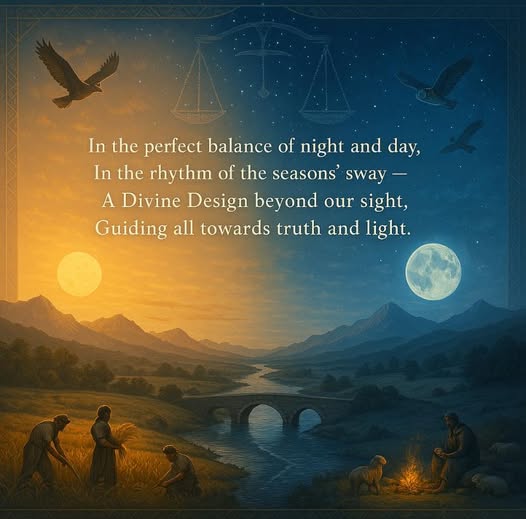
Long ago—before steel cities rose and before men thought they ruled the earth—there lived a boy named Idris in a quiet valley nestled between mountains and meadows. One evening, as twilight softened the edges of the world, Idris sat beside his grandfather near the warmth of a flickering lantern. The hush of night settled upon the land like a gentle quilt.
“Grandfather,” Idris asked, eyes lifted to the starlit sky, “why is the night so dark?”
The old man smiled, his face creased with age and wisdom. “Ah, Idris,” he began, “the Almighty made the night dark not to frighten us, but so we may rest. Just as a mother dims the lights to calm her child, so too does the night come—soft and quiet—to cradle the world in sleep.”
Idris leaned closer. “And the day?”
“The day,” Grandfather said, gesturing toward the horizon where the last gold of sunlight faded, “is bright and warm so we may seek, build, wonder, and work. The day stretches its arms wide and says, ‘Here—I’ve scattered opportunities for you. Go and find them.’”
The boy pondered that. “So they work together?”
“Yes,” Grandfather nodded. “Like two faithful companions. The day and the night take turns—never arguing, never competing. Each knows its role. This harmony, my child, is a sign for those who reflect. It’s not chaos—it’s design. And where there is design, there is a Designer.”
Idris gazed upward again, more thoughtfully this time, as if the stars held secrets beyond their shine.
“Look around you,” Grandfather continued, sweeping his hand over the earth. “The trees that offer shade, the water that quenches, the animals that serve, the air we breathe but never paid for, the sun that warms, the moon that guides—all of it, perfectly placed. This is no accident. It is a life-support system. And it is not ours.”
“Then whose is it?” Idris whispered.
“It belongs to the Almighty,” Grandfather replied, his voice low with reverence. “Everything in the heavens and on the earth is His. And He—out of mercy—let it serve us. But do you think such gifts come without purpose? That life is just a playground to laugh and forget?”
Idris shook his head slowly. “No… I don’t think so.”
“You’re right not to. The mind in your head, the breath in your chest—these are not toys. They are trust. There is more after this life. This world is not the end. It’s the beginning of a test—one where every choice matters.”
The fire crackled between them, as if affirming the truth in his words.
“God did not create this world so one nation might enslave another,” Grandfather said firmly. “Instead, He wove the world with balance. One land has gold, another has grain. One has rivers, another has stone. So no people could say, ‘We have it all.’ He made nations need one another, so that pride would bend into humility.”
“But why allow governments, then?” Idris asked.
“Because freedom itself is a test,” Grandfather replied. “Without order, the strong would crush the weak. So God permitted governments to exist—not to dominate, but to protect. Like bones that help the body stand tall, yet must also bend in prayer—power must know humility.”
He looked into Idris’ eyes, his voice now slow and steady.
“And just as God manages the turning of the night and the rising of the sun… so too does He manage the affairs of nations. Quietly. Justly. Those who corrupt freedom, twist power, and oppress others—they may flourish for a time, but justice always follows tyranny. The world’s balance is not man’s to break.”
He paused, letting the silence carry the weight of that truth.
“The Almighty, in His infinite wisdom, designed a world where no empire lasts forever. And those who forget this—who think they can rewrite the order with greed or force—will find their towers crumbling and their souls heavy with regret.”
The night deepened. A hush fell over the valley.
Grandfather leaned back and closed his eyes. “Remember this, Idris. The day and the night speak, if you’re willing to listen.”
And as the stars blinked above like watching eyes, Idris began to understand:
He was not the owner of this world.
He was its guest.
And like any guest, he must be grateful, careful, and aware—
Because One was always watching.
Not to punish.
But to see… who understood.

